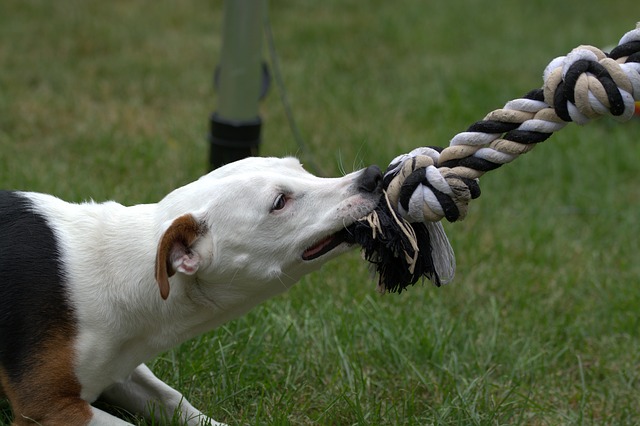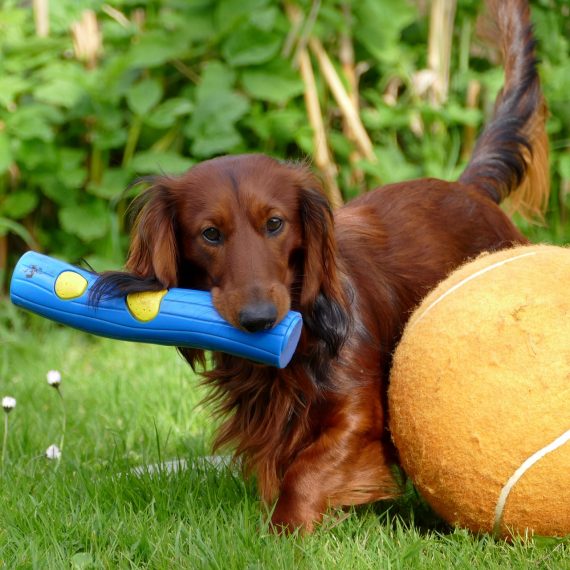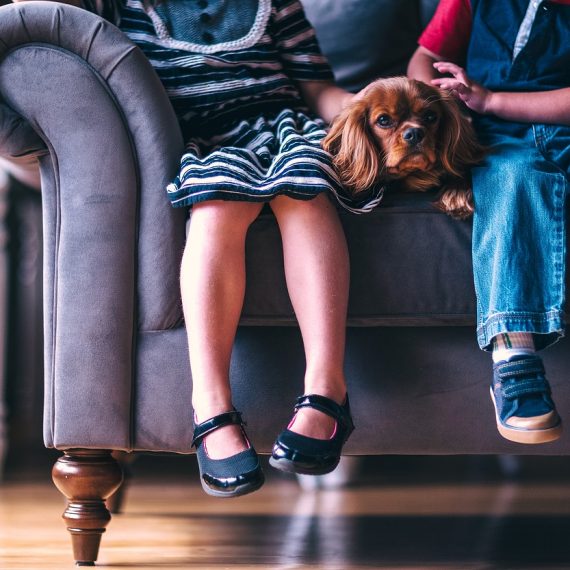
Are You Playing With Your Dog Enough?
We all know that our dog’s require at least basic training and regular exercise to be mentally healthy and to keep them safe out and about on walks, but were you aware of how important it is to spend time playing with your dog too?
Here are 5 reasons why playing with your dog could lead to better behaviour, easier training and in general a more relaxed and confident member of the family.
1. Playing Satisfies a Basic Need & Improves Dog-Owner Bond
Play is an essential part of a dog’s well being throughout their lifetime. It’s not ‘just for fun’ but also plays an important part in helping to build a strong bond between owners and their four legged pals. When our dogs play they engage natural instinctive canine behaviours like chasing, retrieving, hunting and tracking and being able to exercise these characteristics through play contributes, not only to their well being, but also to building their confidence. A relaxed and confident dog is far less likely to have reactivity issues, and be much better at focusing which makes training easier and more successful.
A lack of bond between an owner and their dog can be a major barrier to successful training
2. Playing is Part of Their Education
Puppies start to play with their littermates as young as four or five weeks old, learning valuable and important ‘dog skills’ such as bite inhibition and appropriate dog to dog manners. As young dogs develop, their minds are expanded through engagement in different types of games (some of which we may call training) so you can provide your puppy with different challenges and problem solving experiences. All of these will not only stimulate his mind but also enhance his lifestyle, improve physical capabilities, flexibility, coordination skills and muscle development.
It is thought that animals who play more and have good sensory stimulation,
can grow up to be more intelligent, form better bonds and have a calmer nature.

3. Playing Can Help Strengthen Behaviour Reliability
The success of dogs who are able to do important, complicated and dangerous jobs, depends upon their desire to play and the satisfaction they gain from doing so. It is worth remembering when we’re training our dogs, if it’s not fun, then it’s less likely to be successful. Service dogs in the Army, the Police Force, Drug Detection Dogs, Hearing Dogs, Guide Dogs for the Blind are all taught by education through play. This is how they are able to excel at what they do and be completely reliable and consistent in their responses, simply put, they enjoy it!
Everybody, including dogs, learn faster and easier when learning is fun.
4. Playing Satisfies Instinctive Desires & Helps Prevent Behaviour Problems
The variety of games we can play with our dogs is a seemingly endless list, but when we choose games that incorporate our dogs instinctive behaviours, we can add an element of control over when and where our dog practices these behaviours.
By satisfying these natural desires through play, we reduce the likelihood that our dog or puppy will find other ways of playing these games. Behaviours such as chasing bikes, joggers, cars etc, digging up the garden, or finding things to pull out and chew, could all become daily activities in the absence of adequate mental fulfilment. So it makes sense, the more we can include these behaviours in the games we play with our dogs, then the less likely they are going to take place at times when we don’t want them to!
Work with your dog’s natural desires to build strength into behaviours you can control
5. Playing Reduces Stress
Playing games or simply having fun with you, is one of the best ways to reduce stress for your dog. Much the same as with people, dogs encounter things on a daily basis that ‘stress them out’ to varying degrees. For most dogs, these will be minor stressors (for others the stress response may be higher) but sometimes, even these low level stressors can start to build up. This is what’s known as trigger or stress stacking, and it takes time for these stress levels to subside.
What we can do however, to help avoid excessive build up of stress hormones in our dogs, is to play with them! Playing can help them unwind and release tension, which in turn helps them cope with all those everyday stresses, making for a calmer, better balanced dog.
Remember though, stress is individual to each dog, what is stressful to one may not be to another and vice versa. It’s important to be able to recognise signs of stress in your own dog, so you will know if you need to make any changes to his routine or environment to help him. You can read more about recognising signs of stress in our article on Stress in Dogs HERE
(IMPORTANT NOTE: It is worth pointing out here, you need to make sure your dog enjoys playing and doesn’t actually get stressed out by it!)
Not only is playing with our dogs a great way to help reduce their stress levels,
It can also have a positive impact on our own stress levels! Win Win!

Recommended Games
Most dogs will enjoy a wide variety of games, some are naturals at it, others may not be. An adult dog that has never been played with, may not understand how to play or even that it can be fun, so watch out for any signs of stress. Puppy games need to be short and simple, but as he grows in mental and physical age, the games can increase in duration and complexity.
Examples of Good Games
- Fetch
- Hide & Seek with people
- Hide & Seek with Toys or treats
- Find It – Scentwork/Nosework
- Just for Fun Tricks – Spin, Jump for Joy, Bow, Beg, Roll over, Fetch a Named Toy
- Useful & Functional Tricks – Tidy up your toys, close the door, fetch my slippers, Hide
- Safe Tug of War- Make sure you teach your dog to release on cue
- Ping Pong Recall
Games to Avoid
These games all induce high levels of arousal and frustration. For example, when we play rough and tumble, we use our hands and arms to play, dogs use their teeth! This game encourages nipping, biting and gives your puppy the impression that it is acceptable to jump all over people, which may be ok when he is small, but not so much when he gets bigger and wants to do it.
Chase games induce a dog’s prey drive and can result in unwanted nipping and biting, best avoided especially by children.
Tug of war is also a game best avoided by children, but you can teach your puppy from an early age how to play this game nicely, to ensure he can continue to play nicely as an adult. Once taught properly this is an excellent game that can be used both as a reward in training and also to wear your dog out.
Examples of Games to Avoid
- Rough and Tumble
- Chasing people
- Uncontrolled Tug of War
- Fetching sticks – Danger of lacerations to the throat and mouth which can cause death
ALWAYS SUPERVISE CHILDREN PLAYING WITH PUPPIES & DOGS

If You Are Thinking of Getting a Dog
An important factor for any new dog owner to consider, is exactly how much commitment to this aspect of owning a dog they are prepared to make. Some breeds are characteristically more demanding than others and it is imperative that new owners are aware of the level of exercise and mental stimulation required by their chosen breed before entering into the relationship.
To ignore these basic aspects of a dog’s nature when considering which breed of dog to choose, usually ends in disaster and a whole lot of stress for both owner & dog Sadly, it’s at this point many dogs end up on the streets or in the dog pounds.
Please choose carefully
If you enjoyed this article and think it would be useful for others, please feel free to share it